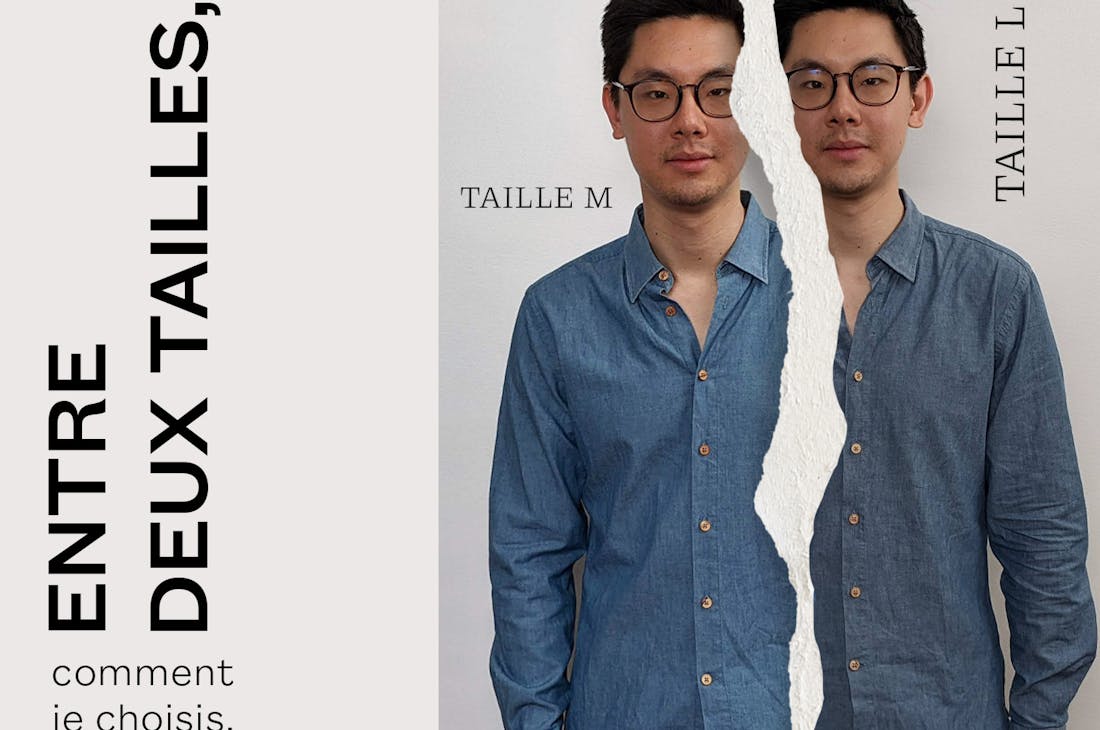In the family of existential clothing questions, the one about hesitating between two sizes is at the top of the basket.
For some, this concern is even permanent : I'm talking about people who are always between two sizes, whether because they are not sure which suits them best (a little more fitted or a little looser ) or because of physical particularities.
And it turns out that's quite the case for me. I'm between sizes on a lot of clothes :
- At the top, I oscillate between M and L
- Below, between 48 and 50 in Italian size, 31 and 32 in American size
- In shoes, between 42 and 43
However, I'm doing well: I no longer really feel a feeling of dissatisfaction with certain clothes that I find a little too small or too big, as may have been the case in the past.
In this article, I share with you my thoughts on my size choices by type of clothing, based on my morphological particularities.
This is a concrete case that echoes this video by Nicolò:
MY MEASUREMENTS
I am 1m88 tall and weigh 81kg.
For my precise measurements, I don't know them exactly but I can give an order of magnitude, within 1 or 2cm:
- Shoulder width: 43/44cm
- Chest measurement: 95/97cm
- Waist circumference: 83/85cm
- Thigh width: 60/61cm
THE HIGHTS
1. SHIRTS AND OVERSHIRTS
In terms of body shape, I have a slightly developed upper body, which creates an in-between space.
The M therefore tends to be tight, especially in the armpits or back. As for the L, I'm more comfortable but I don't quite fill it in certain places: it's often a little wide at the sleeves or at the waist.
That being said, here is how I do it:
- If the cut is fitted, I take a size L
- If the cut is straight, I take a size M
Concretely, on BonneGueule shirts, I take L on our fitted cut and M on our straighter cut.


On the left, the Albiate shirt, fitted cut, size L: a little wide on the arms, generally acceptable. Sorry for the creases!
On the right, the Amami shirt, straight cut, size M: good rendering and comfort is present
A shirt from us with a fitted cut in M is a little tight. I fit into it, some will think it suits me well but I lack a little comfort in my movements.

Albiate slim fit shirt, size M: visual rendering ok but it's a little tight if I move
2. SWEATERS
I take almost all my sweaters in M.
As it is knitted, there is a natural elasticity with this type of garment, which allows me to not be tight or hampered when moving.
From a style point of view, I like to wear my sweaters rather fitted. I find it flattering on my figure and goes well with the looser pants that I like. On me, this is what it looks like:

BonneGueule t-shirt, l’Exception polo shirt, vintage pants, German Army Trainers sneakers
3. T-SHIRTS
I separate the sweater from the t-shirt because my approach is different.
I prefer to wear my t-shirts in a slightly more relaxed way so I tend more naturally towards a size L.

Berni t-shirt, size L: good, nothing to report
3. BLAZERS AND COATS
Blazers and coats are often in Italian sizes (46, 48, 50, etc.).
And it turns out that in this sizing system, I'm a 50 almost all the time . As such, some brands consider the 50 to be an L, others that it is more of an M/L, for example Suitsupply:

Even if not all 50 are created equal, it's almost always the size that suits me best.
So, the sometimes ambiguous status of this size works rather in my favor.
Here is an example with a blazer:

Nozze jacket size 50: good
THE SOCKS
It took me a while to understand my leg shape.
It turns out that I have a thinner waist compared to my thighs and especially my pelvis.
My real size, the one that corresponds to my waist measurement, is 48 Italian or 31 American. If I take this, I am well supported at the waist... but too tight at the buttocks and sometimes at the thighs.
Here is an example with one of my pants ( De Bonne Facture ) in size 48:


Above you can see that from the front it's fine, I'm held just right. On the other hand, seen from behind, it's a little too tight at the buttocks.
For this reason, I tend to take the larger size, so 50(IT) or 32(US).
So, you may ask yourself:
"So that means your pants are too baggy at the waist. How do you do it?"
I'm one of those who think that pants that are too wide at the waist aren't a big deal. Here's how I get away with it:
Often, I wear a belt to be well supported, hence my interest in this accessory which, in addition to its aesthetic side, has a real practical interest:
If the pants are really too wide at the waist or have too many creases at the waist, I have them reduced during alterations.
On the other hand, I am careful not to retouch too much because otherwise, it is too tight at the buttocks as shown above. Indeed, an alteration of the waistline on pants is done via the central rear seam: reducing the waistline also means reducing the space at the buttocks level.

Retouching is sometimes extremely useful, but in my case, it is not systematic. Credit: Charles Ciccione for Getty Images
There are also other configurations that do not require alterations or belts.
I think first of the clamping tabs. I have two or three pants that are equipped with them. This is very useful to me and I tend to tighten them as much as possible.

Pini Parma
You also have pants with elasticated waist and drawstring . This is a configuration that suits me very well because I can tighten as I wish and the folds are distributed around the elastic for a harmonious result.
To extend your thoughts on this subject, I invite you to consult this article that I wrote:
THE SHOES
The verdict is clear: my feet are rather wide and short.

Credit: George Cleverley Bespoke.
Not too much, but enough for me to notice. How did I realize this exactly? Thanks to all my shoe fittings.
I noted that :
- When I fill the shoe well in width, I have room in length, my big toe is quite far from the end
- When I fill the length well, it's too tight in width
For this reason, I find that basing yourself on the length of your foot to choose your size is not very appropriate , because a foot or a shoe cannot be summed up by its length alone: it is also a width and, so more generally, a three-dimensional volume.
Would you buy a piece of furniture based only on its length and ignore the width and height?D
In my case, the main criterion for choosing my shoes is to have the right width:
- If I feel tight, I don't take
- If the width is good and it's a little long in front, that suits me. Since the foot is well supported in width, it does not slide back and forth in the shoe: the space at the front is not annoying.
Concretely, for city shoes, I take 42.5 (8.5UK) and I do not choose a shape that is too narrow or elongated. I favor wider and shorter, rounder shapes.


There was a time when I tried to take a 42, telling myself that it would relax in width but it didn't work. the trigger was too weak and I was too tight even after many (and painful) ports.
For sneakers, there is rarely a half size so I tend to take the size larger, so 43. I consider that sneakers should be comfortable, that they should not be too tight. If necessary, I add a small insole to the shoe, tighten the laces a little tighter and get out of there.
THE FINAL WORD
As Jordan says, all thinking about style starts with thinking about the body . That's the whole point of this article he wrote:
For my part, I understood my body thanks to all my clothes fittings, during which I noticed recurrences.
Once you understand your body, you can think about style. As such, I think that if you are between two sizes, playing with the cuts of your clothes is a good way to get by . At the same size, a straight or fitted cut will suit certain sizes better.
I know for example that at the top, I will prefer a size M and a straight cut.
Finally, retouching is a solution that may be necessary in certain cases: a slight adjustment here or there can really help the fit or comfort of a piece.
And you, what are your clothing constraints and how do you cope?
To go further, I advise you to watch the following content:





